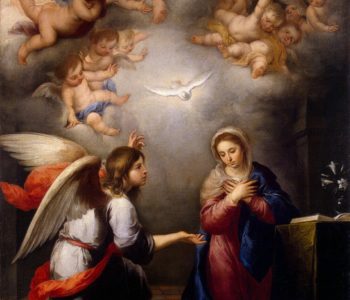 Just a week after observing the Passion of our Lord and then celebrating the Resurrection, the Church calendar takes somewhat of a momentary step out of Easter readings in order to recognize the Annunciation of our Lord.
Just a week after observing the Passion of our Lord and then celebrating the Resurrection, the Church calendar takes somewhat of a momentary step out of Easter readings in order to recognize the Annunciation of our Lord.
This is a Liturgical day that typically falls on March 25, exactly nine months before Christmas, and invites us to read and meditate on the night the Angel Gabriel paid a surprise visit to the young virgin Mary to announce that she had been chosen by God to bear His only Son so that He may save the world.
Because March 25 fell on Good Friday, the Church moved the Solemnity of the Annunciation to today, the first day outside of the Easter Octave.
While it might seem a bit odd to think of the conception of our Lord so soon after reliving his sacrificial suffering, death and resurrection, today’s second reading provides a nice tie-in to the very nature of sacrifice as it once was, as it became and as it is today.
Here is the key portion of the letter to the Hebrews:
“Brothers and sisters: It is impossible that the blood of bulls and goats take away sins. For this reason, when Christ came into the world, he said: “Sacrifice and offering you did not desire, but a body you prepared for me; in holocausts and sin offerings you took no delight. Then I said, ‘As is written of me in the scroll, behold, I come to do your will, O God.’”
In this letter, Paul is saying that the ancient practice of sacrificing animals as a way to expiate our sins was something that never really worked. God never delighted in the sacrifice of animals … that was a manmade solution to the challenge of finding a way to please God.
Ancient traditions … carried out in a number of cultures which understood blood as the key to life for animals, mankind and for a God they could not see, nor understand. Some cultures sacrificed humans, particularly women and babies. Others stuck with animals, often goats, bulls, ox and horses. Some Greek religions sacrificed edible birds and fish.
Paul tells us – and even the Psalms say – God does not delight in the sacrifice of animals … he delights in the conversion of hearts. And our faith teaches us that at a certain point in the history of man, God decided to insert himself into our world, becoming a man, born of human flesh.
That very act of sacrifice – God sending his only son to us so that He could become the new “sacrificial lamb” – is what we celebrate daily at the altar, but in an even more particular way today.
The story of the Annunciation often focuses on the miracle of our Lord, giving of Himself so that the woman who knew no man would be suddenly with child. But let’s never forget that Mary had to cooperate … she had to say yes for the plan to work.
She had to make her own sacrifice … a sacrifice of her own body … in order to bring to life He who would save us all through His own life, death and resurrection. It’s a miracle of salvation that continues to take place today through the Eucharist.
Today is one of those days to reflect on the word “sacrifice” and what is meant before vs. what it means today. Today we don’t sacrifice humans, nor do we sacrifice animals. We seek God with a humble and contrite heart and our sacrifices are more apt to be the sacrifice of time, talent and treasure to help our fellow man or to draw others closer to God.
Each Sunday, we gather all of those sacrifices and offer them up to God so that he may perfect them and join them with the perfect sacrifice that was made once and for all by His son, Jesus.
Today is a day to pause and reflect that the miracle of Easter would not have been possible without the sacrifice made by Mary so many years ago. She said yes. What will you say when God comes knocking on your door?
